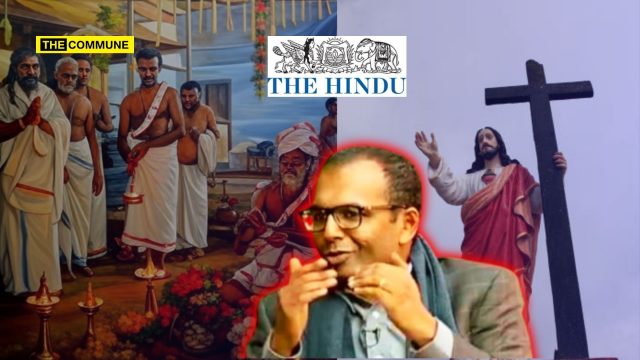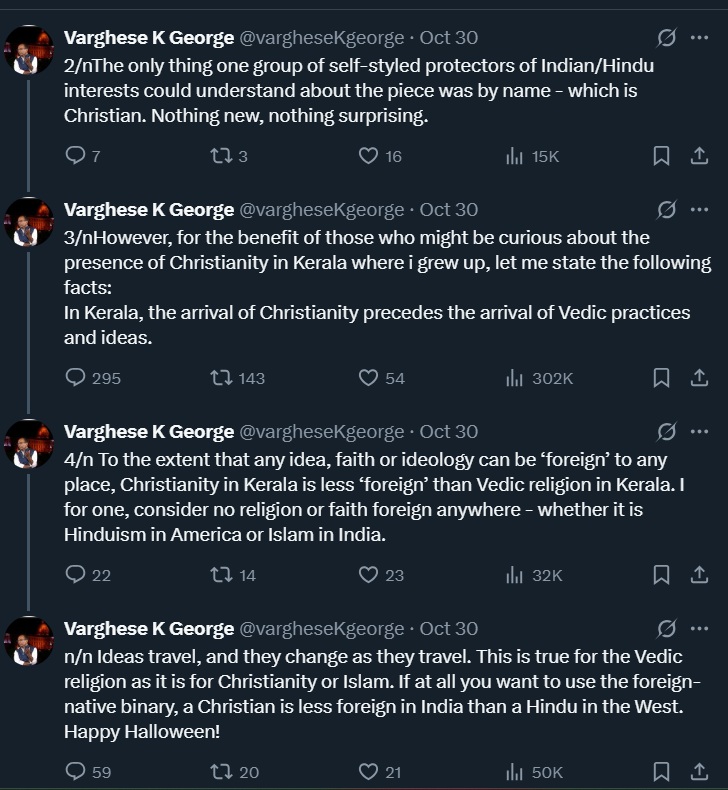“Arrival Of Christianity In Kerala Precedes Vedic Practices”: The Hindu Journo Varghese K George Speaks Like A Christian Missionary, But Parashurama’s Land Is Older Than His Paramapitha’s History October 31, 2025

A senior journalist with The Hindu, Varghese K George, has stirred fresh controversy with a social media thread that reads more like a sermon than a sober rejoinder. Responding to criticism of his recent column on the Indian diaspora, George made a sweeping claim that “the arrival of Christianity in Kerala precedes the arrival of Vedic practices and ideas,” adding that Christianity is “less foreign” to India than Hinduism is to the West.
His statement came after backlash to his article titled “India’s Diaspora diplomacy and the limits of cultural nationalism abroad” where he argued that the display of Hindu cultural practices such as Ganesh visarjan (immersion) or Deepavali fireworks in countries like Canada, the US, and Australia risked crossing “limits of acceptable public behaviour.” He suggested that the Indian diaspora’s growing cultural assertiveness was colliding with “heightened nationalism” and “fear of foreign interference” in the West.
But when confronted by readers who saw his piece as one-sided and subtly anti-Hindu, George deflected with an extraordinary historical assertion about the supposed precedence of Christianity over Vedic traditions in Kerala.
“In Kerala,” he wrote, “the arrival of Christianity precedes the arrival of Vedic practices and ideas… To the extent that any idea, faith or ideology can be ‘foreign’ to any place, Christianity in Kerala is less ‘foreign’ than Vedic religion in Kerala.”

Such a statement would sound familiar to anyone versed in missionary rhetoric from the colonial era – the very line once used by European proselytizers to claim antiquity and legitimacy for imported faiths in the subcontinent. George’s framing not only dismisses well-established archaeological and textual evidence of pre-Christian Vedic and Dravidian cultural presence in the region, but also recycles the long-debunked “St. Thomas in India” narrative used to lend ancient roots to Christianity on Indian soil.
Hinduism In Kerala Is Older Than His Imported Religion
Varghese K. George’s claim that “the arrival of Christianity in Kerala precedes the arrival of Vedic practices and ideas” isn’t just historically untenable — it’s an echo of missionary propaganda that scholars discredited decades ago. Such assertions aren’t history; they’re theology masquerading as journalism.
Long before the first missionary ships from Rome or Syria touched India’s western coast, Kerala had already absorbed centuries of Vedic thought, ritual, and philosophy. The state’s cultural and spiritual landscape — its temple architecture, oral recitations, and priestly lineages — are steeped in a continuity that traces back to the earliest strata of Indian civilization.
Let’s begin with the foundation myth of the land itself. Kerala, according to tradition, was reclaimed from the sea by Parashurama, the sixth avatar of Vishnu. He hurled his axe from Gokarna southward, commanding the ocean to retreat, thus creating the fertile strip we know today as Kerala — Bhargava Kshetram, the Land of Parashurama. This isn’t merely legend; it’s a civilizational charter. It explains why Kerala’s very geography, temple layout, and social institutions are tied to Vedic cosmology and ritual systems.
Long before any cross or chalice appeared on the Malabar coast, Kerala’s spiritual soil was rich with Hindu syncretism. The worship of Bhagavathi (the Mother Goddess), Ayyappa (the celibate warrior-deity of Sabarimala), Kuttichathan, Serpent gods (Nāga Devatas), and Kandanar Kelan blended seamlessly with the Vedic fire sacrifices and temple rituals introduced by the Namboothiri Brahmins. The Theyyam performances of North Kerala, where gods and ancestors descend to dance among the people, draw directly from this indigenous spiritual continuum — not from imported creeds or colonial catechisms.
Vedic learning thrived here centuries before the supposed arrival of St. Thomas. The Śrauta yajnas performed by Namboothiri priests in villages like Panjal are not re-enactments — they are living fossils of rituals described in the Taittirīya Brāhmaṇa. The Vedic Manuscripts in Kerala study records how ancient methods of oral transmission have survived “from very ancient days” preserving the ṛg, yajus, and sāma chants in pristine form.
Even modern scholars acknowledge that Kerala’s Hinduism is an intricate blend of Vedic Brahmanism and nature worship belief systems — a synthesis that long predates Christian contact.
By contrast, the tale of Christianity’s origin in Kerala — the legend of St. Thomas arriving in AD 52 — is, at best, tradition, not verified history. The Kerala Tourism department itself concedes that “the visit of St. Thomas is still a matter of dispute among historians.” Even Encyclopaedia Britannica terms it “a matter of tradition.” No archaeological trace, no contemporary record, and no textual mention supports the claim of a first-century Christian presence. It survives because it flatters the colonial ego — the same way some Indian elites today flatter Western narratives to appear “liberal” and “objective.”
So when George tweets that Christianity is “less foreign” to Kerala than Vedic religion, he isn’t offering history — he’s delivering a sermon. The statement is theological, not factual; ideological, not analytical. It’s the familiar trope of Christian exceptionalism disguised as secular rationality — the colonial impulse to declare the native faith as alien and the imported one as indigenous.
If his logic were applied globally, we’d have to call Islam “less foreign” to Spain than Catholicism, or claim that the British monarchy predates Stonehenge. Such historical gymnastics belong not in journalism, but in pulp theology.
Kerala’s cultural memory tells a different story — one sung in the chants of Soma Yajnas, painted in the Theyyams, and carved in the granite sanctums of Bhagavathi temples. It’s a land where every grove, river, and shrine still whispers Vedic rhythm. The soul of Kerala wasn’t baptized — it was born of fire, mantra, and myth.
In trying to “decolonize” Hindus abroad, Varghese K. George has instead revealed how thoroughly colonized his own mind remains.
Drop The Pen And Wear A White Frock
Ironically, while George’s original article warned about “Indian cultural nationalism” spreading abroad, his own argument now reveals the unmistakable tone of Christian cultural nationalism – one that subtly delegitimizes Hinduism’s roots while positioning Christianity as a “native” Indian tradition.
A Hindu asserting that Vedic ideas preceded Christianity would be instantly branded “chauvinist,” yet a journalist in a mainstream national daily can claim the reverse without scrutiny. The outrage over his remarks has intensified not just because of the historical inaccuracy but because it exposes the ideological bias of a section of Indian media elites who routinely deride Hindu cultural expression as “exhibitionism” but romanticize Abrahamic proselytization as “universal” or “humanist.”
By reducing Hindu practices abroad to a “foreign interference” problem and elevating Christianity as indigenous, George inadvertently reinforces exactly what many accuse the Westernized Indian media of doing – echoing colonial tropes about Hinduism being alien, oppressive, or backward while framing Christianity as civilizationally benign.
If The Hindu journalist’s goal was to appear “objective,” his thread achieved the opposite. The claim that Christianity is “less foreign” than the Vedic religion in Kerala may win applause among missionary historians, but it is tone-deaf and factually unsound, especially coming from someone who positions himself as a journalist.
For a publication that claims to write with ‘rationality and secularism’, George’s pronouncements have crossed into theological apologetics. His remarks sound less like historical analysis and more like a carefully coded defense of Christian exceptionalism – the very ideology that once justified colonial conquest.
In trying to lecture Indian Hindus about “acceptable public behaviour” and “foreign interference,” Varghese K George has instead revealed how deeply colonial categories still shape the Indian English media’s moral compass.

No comments:
Post a Comment